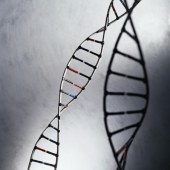
WEDNESDAY, June 18, 2014 (HealthDay News) — Four rare mutations in a single gene reduce the risk of heart disease by 40 percent, a new study suggests.
The discovery could lead to the development of new drugs to fight heart disease, according to the researchers at the Broad Institute at Massachusetts General Hospital and colleagues.
They conducted genetic analyses of nearly 4,000 people and identified four mutations in the APOC3 gene that significantly lower levels of triglycerides, a type of fat in the blood, as well as the risk of coronary heart disease.
The APOC3 gene produces a protein that’s believed to prevent the removal of triglycerides from the blood. The four mutations all decrease APOC3 activity.
The findings suggest that high triglyceride levels — rather than low levels of “good” HDL cholesterol — play a major role in heart disease, according to the authors of the study in the June 18 issue of the New England Journal of Medicine.
“The combination of our genetic results, together with recent clinical trials of drugs that raised HDL levels but failed to prevent heart disease, are turning decades of conventional wisdom on its head,” senior author Dr. Sekar Kathiresan, a Broad Institute associate member and director of preventive cardiology at Massachusetts General Hospital, said in an institute news release.
“HDL and triglycerides are both correlated with heart attack, and have an inverse relationship with one another — the lower the HDL, the higher the triglycerides. It has long been presumed that low HDL is the causal factor in heart disease, and triglycerides are along for the ride. But our genetic data indicate that the true causal factor may not be HDL after all, but triglycerides.”
Based on these findings, another member of the research team said preventive measures might need revision.
“We predict that lowering triglycerides specifically through inhibition of APOC3 would have a beneficial effect by lowering disease risk,” study senior co-author Dr. Alex Reiner, a research professor of epidemiology at the University of Washington’s School of Public Health, said in the news release.
Drugs to lower triglyceride levels exist, but have not been shown to prevent heart disease. This may be because their effect on triglyceride levels is relatively modest compared to the much greater impact of the APOC3 mutations, the researchers said.
More information
The U.S. National Library of Medicine has more about heart disease prevention.
Copyright © 2026 HealthDay. All rights reserved.

